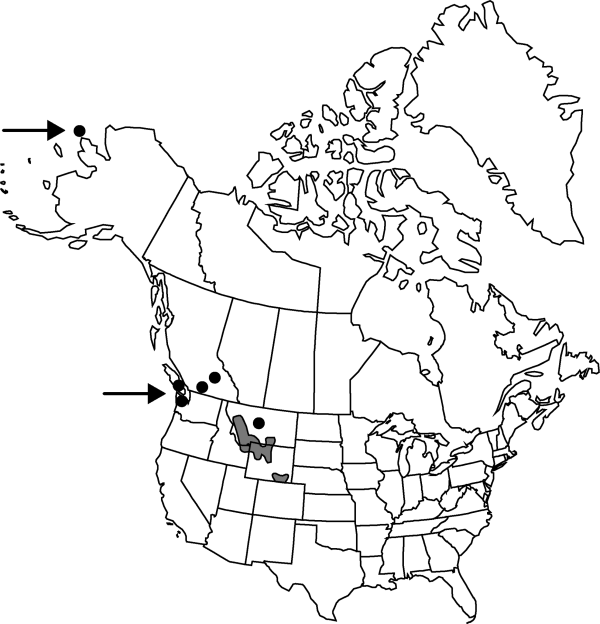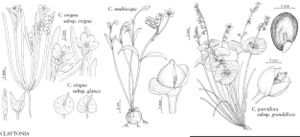Difference between revisions of "Claytonia multiscapa"
Fl. Rocky Mts., 263, 1061. 1917.
FNA>Volume Importer |
FNA>Volume Importer |
||
| Line 12: | Line 12: | ||
|name=Claytonia czukczorum | |name=Claytonia czukczorum | ||
|authority=Volkova | |authority=Volkova | ||
| − | }}{{Treatment/ID/Synonym | + | }} {{Treatment/ID/Synonym |
|name=Claytonia lanceolata var. flava | |name=Claytonia lanceolata var. flava | ||
|authority=(A. Nelson) C. L. Hitchcock | |authority=(A. Nelson) C. L. Hitchcock | ||
| − | }}{{Treatment/ID/Synonym | + | }} {{Treatment/ID/Synonym |
|name=Claytonia lanceolata var. multiscapa | |name=Claytonia lanceolata var. multiscapa | ||
|authority=(Rydberg) C. L. Hitchcock | |authority=(Rydberg) C. L. Hitchcock | ||
| − | }}{{Treatment/ID/Synonym | + | }} {{Treatment/ID/Synonym |
|name=Claytonia lanceolata var. pacifica | |name=Claytonia lanceolata var. pacifica | ||
|authority=McNeill | |authority=McNeill | ||
| − | }}{{Treatment/ID/Synonym | + | }} {{Treatment/ID/Synonym |
|name=Claytonia tuberosa var. czukczorum | |name=Claytonia tuberosa var. czukczorum | ||
|authority=(Volkova) Hultén | |authority=(Volkova) Hultén | ||
| Line 39: | Line 39: | ||
|elevation=0-2000 m | |elevation=0-2000 m | ||
|distribution=B.C.;Alaska;Idaho;Mont.;Wash.;Wyo.;Eurasia (Russia). | |distribution=B.C.;Alaska;Idaho;Mont.;Wash.;Wyo.;Eurasia (Russia). | ||
| − | |discussion=<p>Claytonia multiscapa has been the source of taxonomic differences of opinion. Local floras have treated the synonymous C. flava as a distinct species (e.g., R. D. Dorn 1977) while one regional flora (C. L. Hitchcock et al. 1955–1969, vol. 2) united it with C. lanceolata. It is treated here as a distinct species based on the electrophoretic and field work of J. S. Shelly (1998) and the author’s examination of type material.</p> | + | |discussion=<p><i>Claytonia multiscapa</i> has been the source of taxonomic differences of opinion. Local floras have treated the synonymous <i>C. flava</i> as a distinct species (e.g., R. D. Dorn 1977) while one regional flora (C. L. Hitchcock et al. 1955–1969, vol. 2) united it with <i>C. lanceolata</i>. It is treated here as a distinct species based on the electrophoretic and field work of J. S. Shelly (1998) and the author’s examination of type material.</p> |
|tables= | |tables= | ||
|references= | |references= | ||
| Line 63: | Line 63: | ||
|publication year=1917 | |publication year=1917 | ||
|special status= | |special status= | ||
| − | |source xml=https://jpend@bitbucket.org/aafc-mbb/fna-data-curation.git/src/ | + | |source xml=https://jpend@bitbucket.org/aafc-mbb/fna-data-curation.git/src/8f726806613d60c220dc4493de13607dd3150896/coarse_grained_fna_xml/V4/V4_934.xml |
|genus=Claytonia | |genus=Claytonia | ||
|species=Claytonia multiscapa | |species=Claytonia multiscapa | ||
Revision as of 17:32, 18 September 2019
Plants perennial, with globose tubers 10–30 mm diam.; periderm 1–5 mm. Stems 10–30 cm. Leaves: basal leaves sometimes absent, petiolate, blades linear to narrowly lanceolate, 1–8 × 0.2–1.3 cm, apex acute; cauline leaves sessile, blade linear or linear-lanceolate, 2–10 cm, distinctly tapered. Inflorescences multibracteate; proximalmost bracts leaflike, inserted proximal to pedicels of proximalmost cluster of flowers, distal bracts reduced to membranous scales, rarely with 1 bract. Flowers 8–14 mm diam.; sepals 3–5 mm; petals white with yellow spots at base, creamy white, or rich yellow to yellow-orange, 8–10 mm; ovules 6. Seeds 1–2 mm diam., shiny and smooth to minutely tuberculate; elaiosome 1 mm or less. 2n = 16.
Phenology: Flowering May–Aug.
Habitat: Moist to dry grasslands and montane coniferous forests, often in swales with heavy, poorly drained clay soils in the south to wet, rocky tundra in the north
Elevation: 0-2000 m
Distribution

B.C., Alaska, Idaho, Mont., Wash., Wyo., Eurasia (Russia).
Discussion
Claytonia multiscapa has been the source of taxonomic differences of opinion. Local floras have treated the synonymous C. flava as a distinct species (e.g., R. D. Dorn 1977) while one regional flora (C. L. Hitchcock et al. 1955–1969, vol. 2) united it with C. lanceolata. It is treated here as a distinct species based on the electrophoretic and field work of J. S. Shelly (1998) and the author’s examination of type material.
Selected References
None.
